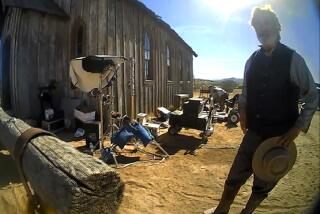Trial Defense by Dying Lawyer Upheld
- Share via
Although a defense attorney was terminally ill with cancer when he unsuccessfully defended a man convicted of murder, a judge has ruled that the defendant will not get a new trial.
The request for a new trial for Paul Sandoval, 23, of San Diego, was made by his new attorney, David Semco, following the death of his trial attorney, Leif Tessem, in March.
Sandoval was convicted Feb. 22 of second-degree murder in the Oct. 1, 1985, shooting of Bret Fuit, 27, of Lemon Grove, who tried to stop an argument between Sandoval and another man.
Over the last few months, San Diego Superior Court Judge William Howatt has held lengthy hearings about Semco’s allegations that Tessem provided inadequate representation at Sandoval’s trial because of his illness.
Semco said Tessem was taking morphine and other drugs to stop the pain during the February trial--about five weeks before he died.
Howatt said the prosecutor sought a first-degree murder conviction, but the jury convicted Sandoval of second-degree murder after six hours of deliberations.
Tessem’s argument was partially effective for his client, the judge said, because of the verdict. Additionally, Howatt said the “only reasonable verdict was second-degree murder.”
The judge also noted that even though Tessem’s voice was hoarse and jurors strained to hear his closing argument, they did listen to it.
Tessem provided “a meaningful defense,” Howatt concluded, even though it was obvious he was “not healthy.”
“He was struck with terminal cancer. My observation during the trial was that he did not move about the courtroom with ease,” Howatt said.
Though the crime was committed six years ago when Sandoval was 17, he was ordered to be tried as an adult.
He was not arrested in the murder case until August, 1990, when he was taken into custody for drinking in public and police discovered a warrant for his arrest.
After the unsuccessful motion Friday, Howatt ordered Sandoval to undergo a diagnostic study at the California Youth Authority, which is mandatory when a juvenile commits a crime, even if they’re ordered tried as an adult.
Sentencing was scheduled for Jan. 2, 1992. He could be given a term in the California Youth Authority or face 15-years-to-life in prison.
A co-defendant in the case, Shawn McFee, 23, is serving 15-years-to-life in prison for second-degree murder. Semco cited a number of things Tessem failed to do for Sandoval, including a request for a judgment of acquittal after the prosecution rested its case.
Howatt said that if Tessem had made such a motion then, it would have been denied.
The judge also said that if a defense attorney believes there is no bona fide defense, the attorney is not required to present one.
Semco said another mistake by Tessem was to not give an opening statement. Defense attorneys can waive an opening statement.
Semco said Tessem didn’t meet with Sandoval enough times to counsel him how to testify before the jury or to explain his strategy and defense.
Tessem also failed to contest some Juvenile Court hearings, Semco said.
Howatt noted that Sandoval was offered a plea-bargain agreement before the trial that included a guilty plea to voluntary manslaughter. Sandoval turned the idea down, however, Howatt said.
Tessem died several days after he was admitted to a hospital March 27.
More to Read
Sign up for Essential California
The most important California stories and recommendations in your inbox every morning.
You may occasionally receive promotional content from the Los Angeles Times.









